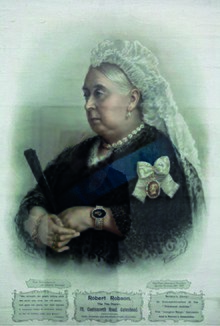
"Recessional" is a poem by Rudyard Kipling. It was composed for the Diamond Jubilee of Queen Victoria, in 1897.

"Recessional" is a poem by Rudyard Kipling. It was composed for the Diamond Jubilee of Queen Victoria, in 1897.

"Recessional" contains five stanzas of six lines each. As a recessional is a hymn or piece of music that is sung or played at the end of a religious service, in some respects the title dictates the form of the poem, which is that of a traditional English hymn.
Initially, Kipling had not intended to write a poem for the Jubilee. It was written and published only towards the close of the Jubilee celebrations, and represents a comment on them, an afterword. The poem was first published in The Times on July 17, 1897. [1]
The poem went against the celebratory mood of the time, providing instead a reminder of the transient nature of British Imperial power. [2] The poem expresses pride in the British Empire, but also an underlying sadness that the Empire must eventually go the way of all previous empires. "The title and its allusion to an end rather than a beginning add solemnity and gravitas to Kipling's message." [3] In the poem, Kipling argues that boasting and jingoism, faults of which he was often accused, were inappropriate and vain in light of the permanence of God.
God of our fathers, known of old,
Lord of our far-flung battle line,
Beneath whose awful hand we hold
Dominion over palm and pine —
Lord God of Hosts, be with us yet,
Lest we forget—lest we forget!
The tumult and the shouting dies;
The Captains and the Kings depart:
Still stands Thine ancient sacrifice,
An humble and a contrite heart.
Lord God of Hosts, be with us yet,
Lest we forget—lest we forget!
Far-called, our navies melt away;
On dune and headland sinks the fire:
Lo, all our pomp of yesterday
Is one with Nineveh and Tyre!
Judge of the Nations, spare us yet,
Lest we forget—lest we forget!
If, drunk with sight of power, we loose
Wild tongues that have not Thee in awe,
Such boastings as the Gentiles use,
Or lesser breeds without the Law—
Lord God of Hosts, be with us yet,
Lest we forget—lest we forget!
For heathen heart that puts her trust
In reeking tube and iron shard,
All valiant dust that builds on dust,
And, guarding, calls not Thee to guard;
For frantic boast and foolish word—
Thy Mercy on Thy People, Lord! [4]
While not particularly religious himself, Kipling understood the value of sacred traditions and processions in English history. As a poet, he drew on the language of the Authorised Version of the Bible, familiar to most of his English-speaking readers, in order to reach a deeper level of response. [1]
The phrase "lest we forget" forms the refrain of "Recessional". It is taken from Deuteronomy 6,12: "Then beware lest thou forget the Lord which brought thee forth out of the land of Egypt". [1] The reference to the "ancient sacrifice" as a "humble and a contrite heart" is taken from the Miserere (Psalm 51). [5]
"Recessional" was reprinted in The Spectator on July 24, 1897. Kipling had composed "The White Man's Burden" for Victoria's jubilee, but replaced it with "Recessional". "Burden", which became better known, was published two years later, and was modified to fit the theme of American expansion after the Spanish–American War. [6] Kipling included the poem in his 1903 collection The Five Nations .
In Australia [7] and New Zealand [8] "Recessional" is sung as a hymn on Anzac Day, to the tune "Melita" ("Eternal Father, Strong to Save"). The Anglican Church of Canada adopted the poem as a hymn, [9] as has the Church of Jesus Christ of Latter-day Saints in a 1985 hymnal. [10]
Leslie Fish set the poem to music, along with several other Kipling poems, on her album "Our Fathers of Old".
T. S. Eliot included the poem in his 1941 collection A Choice of Kipling's Verse .
Pulitzer Prize-winning novelist Allen Drury titled the fifth book in his Advise and Consent series "Come Nineveh, Come Tyre," published in 1973.

Joseph Rudyard Kipling was an English journalist, novelist, poet, and short-story writer. He was born in British India, which inspired much of his work.

The epiclesis refers to the invocation of one or several gods. In ancient Greek religion, the epiclesis was the epithet used as the surname given to a deity in religious contexts. The term was borrowed into the Christian tradition, where it designates the part of the Anaphora by which the priest invokes the Holy Spirit upon the Eucharistic bread and wine in some Christian churches. In most Eastern Christian traditions, the Epiclesis comes after the Anamnesis ; in the Western Rite it usually precedes. In the historic practice of the Western Christian Churches, the consecration is effected at the Words of Institution though during the rise of the Liturgical Movement, many denominations introduced an explicit epiclesis in their liturgies.

"Gloria in excelsis Deo" is a Christian hymn known also as the Greater Doxology and the Angelic Hymn/Hymn of the Angels. The name is often abbreviated to Gloria in Excelsis or simply Gloria.

Frances Ridley Havergal was an English religious poet and hymnwriter. Take My Life and Let it Be and Thy Life for Me are two of her best known hymns. She also wrote hymn melodies, religious tracts, and works for children. She did not occupy, and did not claim for herself, a prominent place as a poet, but she carved out a niche for herself.

"Alma Redemptoris Mater" is a Marian hymn, written in Latin hexameter, and one of four seasonal liturgical Marian antiphons sung at the end of the office of Compline.
Edward Woodall Naylor was an English organist and composer.

A grace is a short prayer or thankful phrase said before or after eating. The term most commonly refers to Christian traditions. Some traditions hold that grace and thanksgiving imparts a blessing which sanctifies the meal. In English, reciting such a prayer is sometimes referred to as "saying grace". The term comes from the Ecclesiastical Latin phrase gratiarum actio, "act of thanks." Theologically, the act of saying grace is derived from the Bible, in which Jesus and Saint Paul pray before meals. The practice reflects the belief that humans should thank God who is believed to be the origin of everything.
Phos Hilaron is an ancient Christian hymn originally written in Koine Greek. Often referred to in the Western Church by its Latin title Lumen Hilare, it has been translated into English as O Gladsome Light. It is one of the earliest known Christian hymns recorded outside of the Bible that is still in use today. The hymn is part of vespers in the Eastern Orthodox Church and the Byzantine Rite of the Catholic Church, and also included in some Anglican liturgies and Lutheran hymnals.

"We Gather Together" is a Christian hymn of Dutch origin written in 1597 by Adrianus Valerius as "Wilt heden nu treden" to celebrate the Dutch victory over Spanish forces in the Battle of Turnhout. It was originally set to a Dutch folk tune. In the United States, it is popularly associated with Thanksgiving Day and is often sung at family meals and at religious services on that day.
"For the Beauty of the Earth" is a Christian hymn by Folliott S. Pierpoint (1835-1917).

Sir John Frederick Bridge was an English organist, composer, teacher and writer.
Good Friday Prayer can refer to any of the prayers prayed by Christians on Good Friday, the Friday before Easter, or to all such prayers collectively.

"The Hymn of Joy" is a poem written by Henry van Dyke in 1907 in being a Vocal Version of the famous "Ode to Joy" melody of the final movement of Ludwig van Beethoven's final symphony, Symphony No. 9.

Spiritual communion is a Christian practice of desiring union with Jesus Christ in the Eucharist. It is used as a preparation for Mass and by individuals who cannot receive Holy Communion.

"Lest we forget" is a phrase commonly used in war remembrance services and commemorative occasions in English speaking countries, usually those connected to the British Empire, like Canada and Australia. Before the term was used in reference to soldiers and war, it was first used in an 1897 Christian poem written by Rudyard Kipling called "Recessional", a poem written to commemorate Queen Victoria’s Diamond Jubilee. The phrase occurs eight times; and is repeated at the end of the first four stanzas in order to add particular emphasis regarding the dangers of failing to remember.

The Confederate Monument was a memorial installed in Los Angeles' Hollywood Forever Cemetery, in the U.S. state of California, honoring all Confederates who had died or would die on the Pacific coast. Erected in 1925 in the Confederate section of the cemetery, it was removed in August 2017.
"McAndrew's Hymn" is a poem by English writer Rudyard Kipling (1865–1936). It was begun in 1893, and first published in December 1894 in Scribner's Magazine. It was collected in Kipling's The Seven Seas of 1896. Some editions title the poem "M'Andrew's Hymn".

"Their name liveth for evermore" is a phrase from the Jewish book of Ecclesiasticus or Sirach, chapter 44, verse 14, widely inscribed on war memorials since the First World War.

Adaline Hohf Beery was an American author, newspaper and magazine editor, songbook compiler, as well as a hymnwriter. Born into a Pennsylvania Dutch community, her first job after graduating from Mount Morris College in Illinois was as a compositor in a printing office. She served as the editor of The Golden Dawn magazine and The Young Disciple child's paper; compiled a song-book, Gospel Chimes; and was employed by the Brethren Publishing House.